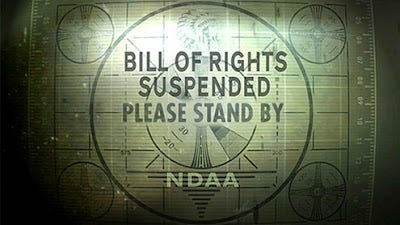The Department of Justice defends the NDAA Act.

The U.S. Justice Department filed its opening brief defending a controversial military detention provision that a trial judge in Manhattan declared unconstitutional earlier this year.
The suit, filed in Manhattan federal district court by a group of journalists and activists, challenges a section of the National Defense Authorization Act that DOJ lawyers said reaffirms presidential detention authority under the Authorization for Use of Military Force, or AUMF. That authorization was passed in response to the Sept. 11 terror attacks.
Government lawyers said in the papers filed last night in the U.S. Court of Appeals for the Second Circuit that the plaintiffs "are in no danger whatsoever of being subject to capture and detention by the U.S. military." The provision in question allows the detention of people who "substantially supported" al-Qaeda or "associated forces." http://legaltimes.typepad.com/files/hedges-doj.pdf
"The district court nonetheless issued an extraordinary and sweeping injunction at their behest," DOJ lawyer August Flentje of the Civil Division said in the brief filed last night. Flentje said the trial judge, Katherine Forrest of U.S. District Court for the Southern District of New York, "entered a sweeping and permanent injunction against the president."
President Barack Obama signed the NDAA last December. He said then that the detention law "breaks no new ground and is unnecessary" because its authority was included in the 2001 enactment of the AUMF.
The DOJ legal team argued several main points in their submission in the appeals court, which agreed to expedite the review of the dispute. The government argued, among other things, that the trial judge's injunction blocking enforcement of the law wasn't "an appropriate exercise of a court's equitable powers."
DOJ also said the plaintiffs don't have a legal foundation to sue in the first place because, according to the government, they face no threat of military detention under the law.
"Rather than interpret the law in a reasonable way, the district court purported to enjoin the President from carrying out his responsibilities under the law as Commander in Chief in an ongoing military conflict," Flentje wrote. "This suit should have been dismissed at the outset for a simple and straightforward reason: plaintiffs lack standing because there is absolutely no basis for concluding that they would be detained under the challenged military force authorization."
http://legaltimes.typepad.com/blt/2012/11/doj-defends-controversial-military-detention-provision-.html#more


